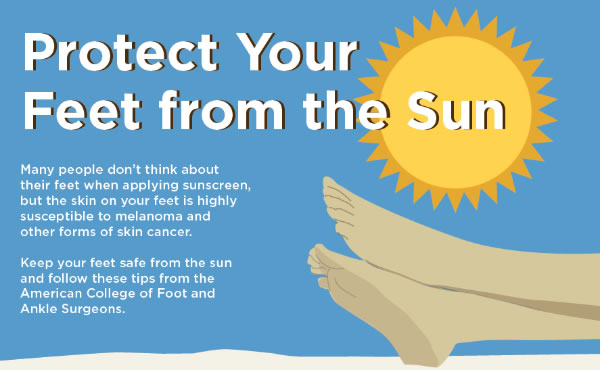Summer Footcare Tips

Summer 2018 Issue of FootNotes
Summer footcare from the American College of Foot and Ankle Surgeons
- Summer Footcare Tips for Fashion with Flip Flops
- Tips for a Safer Barefoot Summer
- Living with Diabetes? Protect Your Feet from Summer Heat
Flip flop sandals and summertime seem to go hand in hand. Summer footcare tip: while these types of sandals are fun and fashionable to wear, they should not be a mainstay of your summer footwear.
Since flip flops have no arch support or stability, wearing them too often can cause abnormal stress on the plantar fascia (the band of tissue that extends from the heel to the base of the toes). The resulting condition, known as plantar fasciitis, usually causes pain in the heel immediately upon rising in the morning or after periods of inactivity during the day. This pain can persist and take a long time to subside.
To avoid developing plantar fasciitis this summer, wear supportive footwear that provides sufficient shock absorption. However, if you insist on wearing flip flops, wear them sparingly!
Safe Summer Footcare: Go barefoot?
Millions of Americans will go barefoot this summer, and thousands will suffer injuries, such as cuts and puncture wounds. Some will develop serious infections that may require surgery. The best way to protect feet and toes from injury is to wear shoes. But if your summer just would not be the same without the sand between your toes or walking in your backyard barefoot, you can make it a safer season by following these tips:
TIP: See one of our foot and ankle surgeons within 24 hours for a puncture wound.
WHY: These injuries can embed unsterile foreign objects deep inside the foot. A puncture wound must be cleaned properly and monitored throughout the healing process. This will help avoid complications, such as tissue and bone infections or damage to tendons and muscles in the foot. Foot and ankle surgeons are trained to properly care for these injuries.
TIP: Make sure you have been vaccinated against tetanus. Experts recommend that teens and adults get a booster shot every 10 years.
WHY: Cuts and puncture wounds from sharp objects can lead to infections and illnesses, such as tetanus.
TIP: Apply sunscreen to the tops and bottoms of your feet.
WHY: Feet get sunburn too, and sun exposure can lead to rare but deadly skin cancers on the feet.
TIP: Inspect your feet and your children’s feet regularly for skin problems, such as warts, calluses, ingrown toenails and suspicious moles, spots or freckles.
WHY: The earlier a skin condition is detected, the easier it is to treat.
TIP: Wear shoes around swimming pools, locker rooms and beaches.
WHY: To avoid cuts and abrasions from rough anti-slip surfaces and sharp objects hidden beneath sandy beaches and to prevent contact with bacteria and viruses that can cause athlete’s foot, plantar warts and other problems.
TIP: Use common sense.
WHY: Every year, people lose toes while mowing the lawn barefoot. Others suffer serious burns from accidentally stepping on stray campfire coals or fireworks. Murky rivers, lakes and ponds can conceal sharp objects underwater.
Contact our office for more summer footcare tips to keep your feet safe throughout the season.
Summer Footcare for Living with Diabetes
If you are living with diabetes, hot and humid summer weather can wreak havoc on your feet. Exposure to extreme heat can lead to:
Swelling: Swollen feet can make your shoes fit tighter and may exert blister-causing pressure on your toes and heels. Wear support stockings to reduce swelling and avoid complications, such as poor circulation and further impaired nerve function.
Dryness & Cracking: Any type of skin break on your feet can become infected and ulcerate if it is not noticed right away. If you wear sandals often during the summer, inspect your feet daily for any cuts, cracks or signs of infection and try to wear regular shoes a few days a week to limit your exposure.
Puncture Wounds, Burns & Blisters: Even just a few minutes of walking barefoot on a hot driveway or sidewalk can badly burn the soles of your feet due to impaired nerve sensation from the disease. Always wear shoes outdoors to protect them from injury.
Vigilant summer footcare is a must if you are living with diabetes. Call our office to schedule regular foot exams to help keep your feet healthy all year long.
